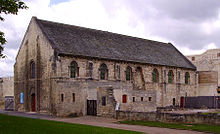Exchequer of Normandy


- View a machine-translated version of the French article.
- Machine translation, like DeepL or Google Translate, is a useful starting point for translations, but translators must revise errors as necessary and confirm that the translation is accurate, rather than simply copy-pasting machine-translated text into the English Wikipedia.
- Consider adding a topic to this template: there are already 1,466 articles in the main category, and specifying
|topic=will aid in categorization. - Do not translate text that appears unreliable or low-quality. If possible, verify the text with references provided in the foreign-language article.
- You must provide copyright attribution in the edit summary accompanying your translation by providing an interlanguage link to the source of your translation. A model attribution edit summary is
Content in this edit is translated from the existing French Wikipedia article at [[:fr:Échiquier de Normandie]]; see its history for attribution. - You may also add the template
{{Translated|fr|Échiquier de Normandie}}to the talk page. - For more guidance, see Wikipedia:Translation.
The Exchequer of Normandy (Échiquier de Normandie) or Exchequer of Rouen (Échiquier de Rouen) was the fiscal and administrative court of the Duchy of Normandy until the early 16th century.
Surviving records show that the Exchequer of Normandy was operating in 1180, while the English Exchequer existed in 1110. No establishment date is known for either and therefore it is impossible to know which existed first. The Dialogue concerning the Exchequer presents it as a general belief that the Norman kings established the English Exchequer loosely modelled on the Norman one, while noting with some doubt an alternative view that an English Exchequer existed in Anglo-Saxon times.
In 1315 the Norman Barons pressed a new charter, the "Charte aux Normands", on Louis X of France, with the result that the decisions of the Exchequer of Normandy were declared final, meaning that Paris could not overturn decisions made in Rouen, and that the King could not raise a new tax on the Normans without their approval.[1]
The Exchequer of Normandy was later superseded by the Parliament of Normandy in 1508.
Related articles
- Rouen Courthouse
Sources
- Encyclopédie ou Dictionnaire raisonné des sciences, des arts et des métiers by Diderot & d’Alembert, vol. 5, p. 260.
References
- ^ Powicke, Maurice. The Loss of Normandy: 1189 - 1204 ; Studies in the History of the Angevin Empire. Nabu Press. p. 272. ISBN 978-1173182311.
- Amable Floquet, Essai historique sur l'Échiquier de Normandie, Rouen, Édouard Frère, 1840.











